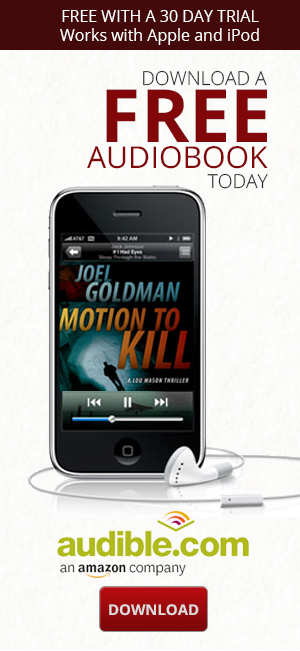The Writer’s Life – Self publishing biz
Welcome to The Writer’s Life; an ongoing discussion with crime novelist Joel Goldman about the writing craft. The publishing business has changed dramatically in recent years. Traditional publishing used to be the only route for serious writers. Saying you were self-published was the kiss of death. Not so anymore. In this episode, Joel shares his experiences in the self-publishing world.
TRANSCRIPT – Self publishing biz
Interviewer:
Joel, it’s great to be with you. Let’s talk about self publishing, because you went into self-publishing a couple of years ago. Before that, you had been published by a traditional publishing house.
Joel:
Yes.
Interviewer:
Talk first about the traditional route, and then tell me how it is that you went into self-publishing.
Joel:
When my first book was released in 2002, traditional publishing was really the only credible route. There were vanity presses, and had been for many, many years. A vanity press oftentimes turned into an author spending $25,000 on 1000 copies of a hardbound book, 10 of which would be foisted off on friends and relatives, and the other 990 would sit in a garage, but the person would have had the satisfaction of having a book with their name on it. Really, traditional publishing was the only option. I was really fortunate that my publisher, Kensington with whom I had a great relationship, took me in and gave me an opportunity.
When you work with a traditional publisher, you get tremendous advantages. You work with a professional editor who will really make your book better and make you a better writer, because those are the people who will tell you what’s good and not good. Doesn’t mean they’re always right, but you’re going to get an objective analysis. You’re going to work with a professional copy editor who most the time, but not always, will catch the mistakes of the character who walks in the room wearing a red shirt and leaves wearing a blue shirt, that sort of thing. You will have a professional marketing team available to you, and you’ll have widespread channels of distribution. If you had to check the boxes for the advantages of traditional publishing, there they are.
The disadvantages of traditional publishing are your royalty rates are comparatively low. In my case, my books came out as paperback originals not in hardcover. People would say, “When’s your book coming out in hardcover?” I would say, “It’s a paperback original.” They would say, “Oh,” as if you to say, “You have an ugly baby.” An 8% royalty. My book sold for $7, my royalty was 8%. My agent got 15% of that, so I was netting about $0.47 or $0.48 per book.
The other reality of traditional publishing is that it may be anywhere from 12 to 18 months from the time that you turn the book in to the publisher until it’s on the shelves being sold. Publishers have a long horizon on their publishing pipeline, and that’s the nature of their business. If you spend a year writing a book, then wait a year to a year and a half for the book to be published, and then wait a year to get the first 6 months of royalties, it’s easy to understand why a lot of writers have day jobs. Self-publishing turns all of that on its head.
Amazon came along and released the Kindle, and that was a huge, huge, huge hit. For the first time, readers began to accept the idea of an electronic reading experience. At the same time, or shortly after the release of the Kindle, Amazon changed the royalty model for the individual independent author, the self-published author. Amazon applied that model so that they paid a 70% royalty if the book was sold at prices between $2.99 and $9.99. In the case of my $7 paperback that Kensington published and I would earn a net $0.47 on that book, I’m selling those books today at $4 and earning $2.80 instead of $0.47 or $0.48.
Interviewer:
That’s quite a huge difference.
Joel:
It’s a game-changer. It’s a life-changer. We had the change in the business model and we had the change in the technology. Then Amazon was able to capture such a significant market share that Amazon became a tremendous platform on which to sell books. If you’re on the blogosphere in the publishing world, you will find many, many people who are happy to wag their finger at Amazon as the devil, and then you’ll find many other people, myself included, who have benefited and continue to benefit from the opportunities that Amazon has presented.
With self-publishing, I am able to apply the same quality standards as a traditional publisher: I have a professional editor, a professional copy editor, a professional cover artist. I use the same quality standards as a traditional publisher to make sure my book is as good as any book that any traditional publisher will release. I have control over my product: I can set the price. I can change the price. I can promote it however I choose to promote it. It’s mine, and I can have the biggest influence on how successful I’m going to be.
Interviewer:
For the vast majority of writers, self-published or otherwise, this particular model appears to be a no-brainer.
Joel:
It’s a no-brainer if you’re an entrepreneur. It’s a no-brainer if you view what you’re doing as a business, if you understand that you’re in the manufacturing business. This is the unromantic, unvarnished part. I’m a manufacturer of books. There are 3 million titles on Amazon. There are tens of thousands of crime fiction titles on Amazon. If people can’t discover your book, you’re not going to sell it. It may be the greatest book ever written, but it’s not going to sell. To say that it’s a no-brainer assumes that the writer is prepared to do the things necessary to be successful. As more and more people have crowded into the space, it’s harder and harder for even established writers to maintain a level of sales.
Interviewer:
Joel Goldman is an international best-selling crime author. His characters Lou Mason, Jack Davis, and Alex Stone wrestle with challenges the rest of us would run away from. Get to know these characters, and you’ll want to come back for more. Thanks for joining us for this installment of Writer’s Life. Additional videos about Joel’s life and work are available on JoelGoldman.com.



